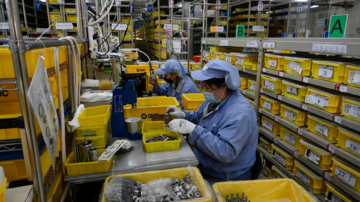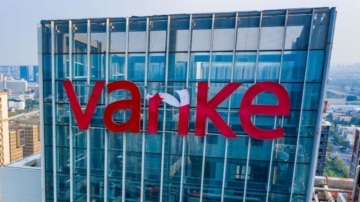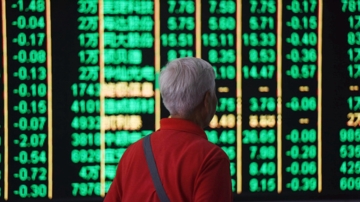【新唐人2014年12月06日讯】最近一段时间以来,大陆股市不断上涨,成交量也暴增,股市达到了2008年股市大跌之前的那种狂热程度。而上一周超过22亿美元的国外资本撤出中国股市,也没有丝毫触动中国股市。不少专家质疑,中国股市为何在中国经济不佳时,反其道而行之?我们一起来听听专家的分析。
12月4号大陆沪指暴涨,再创43月新高,盘中站上2900点关口上涨120点,创两年最大单日涨幅。而深成指数大涨近400点,两市成交额突破9000亿元,石化双雄罕见涨停。
美国《华尔街日报》观察发现,这次牛市行情,大部份涨幅是在过去一个月取得。占中国股市交易额80%左右的散户投资者,也表现出对股市兴趣重燃的态度。万得资讯(WIND INFO)的数据显示,上周股票交易新开账户达到370,071个。
总部位于深圳的某股份制银行理财经理透露,近期申请信用贷款的客户激增,虽然贷款理由写的是“消费”,但据其跟踪,很多贷款资金都投向了股市。
上海某大型券商营业部总经理告诉《上海证券报》记者,近几天,温州炒房团将几个亿的资金腾挪进了股市。而这些炒房团根本不懂估值,也不看逻辑,进场就买,资金直奔券商扫货。
北京师范大学MBA导师段绍译:“中国的老百姓缺少投资机会,央行降息银行利息更低,老百姓更愿意拿点钱去冒险。”
大陆投资顾问邓先生:“从2400点到2800点这一段,基本都是大盘蓝筹在涨,国企和央企是主体,大量的资金,来历不明的资金都涌进来,他们从哪里来的钱呢,中国不只是实体经济很缺钱,地方政府、央企,银行也很缺钱,如果大家都缺钱的情况下,股市疯狂上涨,只能说明一条理由,有人想在这里面出货。”
《华尔街日报》的评论说,中国股市近期的涨势,令人回忆起2008年股市大跌之前出现过的那种狂热,引发风险忧虑。
2007年10月16号,上证综合指数触及6124点,创下历史最高记录,随后出现大幅下跌,到2008年10月28号跌到了1664点。绝大部分散户被套牢。
大陆媒体《汇时讯》也评论说,国家战略资金进场犹如一剂兴奋剂,整个股市都沸腾了。让股市起来把资金在市场聚拢,再通过市场的方式,配置到股市各个风口上,是四两拨千斤的功效。这种方式,最不需要背负政治成本,而战略性牛市,要的就是在泡沫中解决问题。
评论还指出,如果这一波拥抱泡沫的过程经济转型卡壳,那可是比2008年更可怕的经济危机。
不过,目前中共好像还嫌股市不够火爆。据报导,中共银监会加急下发《商业银行理财业务监督管理办法(征求意见稿)》,允许以理财产品的名义独立开立证券账户,鼓励理财产品直接投资债券、股票。
《新浪财经》发现,股市连续大涨已经令银行理财资金,坐立难安急于进场。一些原本选择理财产品的资金正在进入股市。
邓先生:“这里面肯定有一个天大的阴谋,我们的大盘远远脱离了我们基层面,如果我们的经济基本面是沙滩的话,股市正在给我们描绘一个海市蜃楼,国家经济面的指导,方针和文件对股市形成了比较大的引导。暴风雨将要来临的时候,总是比较美好的景象吧。”
目前机构、散户、私募,每一个股市参与者都不愿再踏空。某大型机构投资经理也表示,现在已不看基本面了,只研究“大趋势”,风往哪儿吹就往哪儿跑。等风向变了再全仓杀出走也不迟。
不过,外国资本却不像中国股民一样疯狂。根据澳新银行(ANZ)编制的图表,上周仅仅从中国股权基金撤出的外国资金超过22亿美元,是三年中规模最大的一次。
采访编辑/刘惠 后制/萧宇
A-Shares Skyrocket, The Hot Stock Market Attracts
Worries About Risk.
The Mainland Chinese stock market has continued to rise,
with volumes soaring, reaching extreme levels.
This is similar to conditions before the
stock market crash in 2008.
Over $2.2 billion foreign capital was withdrawn from
China's stock market last week.
It didn’t make any impact on the stock market.
Many experts question why China’s stock market is going
in the opposite direction when the Chinese economy is poor.
Let’s listen to the expert analysis.
On Dec. 4, the Shanghai Composite Index soared,
reaching the highest record in 43 months.
Intraday highs of 2900, increasing 120 points makes it
the biggest one-day gain in two years.
The Shenzhen Component Index rose nearly 400 points.
The turnover of the two indexes exceeded 900 billion yuan.
China Petroleum and China Petrochemical stocks
rarely reached the daily limit.
The Wall Street Journal says most of the gains during
this bull market were made in the past month.
Retail investors that cover 80% of the turnover of China’s
stock market also regained interest in the stock market.
The Wind Info data shows that 370,071 new stock trading
accounts were opened last week.
A financial manager at a joint-stock bank in Shenzhen City
revealed that applications for credit loans recently surged.
Although many customers used consumption as loan reason,
he found out that many invested the money in stock market.
The general manager of a brokerage business department
in Shanghai told Shanghai Securities News that a real estate
group in Wenzhou City invested hundreds of millions of
capital in stock market in recent days.
The real estate group didn’t understand the valuation, and
it wasn’t logical. It directly invested in brokerage, he said.
Duan Shaoyi, MBA instructor at Beijing Normal University,
“Chinese common people lack investment opportunities.
The central bank cut interest rates, and bank interests are
even lower.
Ordinary people would rather take risks to invest money.”
Mr. Deng, investment consultant in mainland China, “From
2400 to 2800 points, it was the cap blue chip that was rising.
The state-owned enterprises and central enterprises were
the main body, and huge funds of unknown origin came in.
Where did they get the money?
Not only the real economy lacks money in China, local
government, central enterprise, and banks also lack money.
If everyone lacks money, while the stock market
is skyrocketing, there’s only one reason.
That someone wants to get rid of stocks through this.”
The Wall Street Journal commentary says the skyrocketing
of Chinese stock market recently reminds people of the
fanaticism in 2008 before the stock market crash. It raises
worries about risks.
On Oct. 16, 2007, the Shanghai Composite Index reached
6124, the highest record in history. It then fell sharply.
By Oct. 28, 2008, the index fell to 1664. The vast majority
of individual investors were stuck.
Chinese media Fx567.com also commented that national
strategic funding approach is like a stimulant.
This makes the entire stock market boiling. It raises the stock
market to gather capitals in the market.
It then configures capitals to each outlet of the stock market
through the market, which is skillfully deflected.
Such a method doesn’t bear on the surface.
The commentary also says if the economic transformation
stuck during the foam period, there would be an even worse
economic crisis than the one in 2008.
But, the Chinese Communist Party (CCP) seems to want a
hotter stock market.
Chinese media says China Banking Regulatory Commission
urgently issued a draft of Commercial Bank Financial Services
Supervision and Administration, allowing banks to open
independent securities account in name of financial products.
The draft encourages customers to invest
financial products in bonds and stocks.
Sina Finance said the continuous rise in stock market has
made bank financial funds eager to get into the stock market.
Some capital originally for financial products is
getting into the stock market now.
Mr. Deng, “There must be a big conspiracy. The market is
far away from the grassroot.
If the economic market is a beach, the stock market
is creating a mirage.
The state economic instruction, policy, and documents
largely influenced the stock market.
The scenery is always pretty before the storm comes.”
Institutions, retail, private equity, and every investor in the
stock market doesn’t want to lose again.
An investment manager of a large institution indicated that
they only care about the “major trend” now.
They go wherever the trend goes. He said it won’t be
too late to clear the stock when the trend changes.
However, foreign capital investors are not as
crazy as Chinese investors.
According to ANZ data, over $2.2 billion of foreign capital
was withdrawn from the China Equity Fund last week.
That makes it the biggest withdrawal in three years.
Interview & Edit/ LiuHui Post-Production/XiaoYu
12月4号大陆沪指暴涨,再创43月新高,盘中站上2900点关口上涨120点,创两年最大单日涨幅。而深成指数大涨近400点,两市成交额突破9000亿元,石化双雄罕见涨停。
美国《华尔街日报》观察发现,这次牛市行情,大部份涨幅是在过去一个月取得。占中国股市交易额80%左右的散户投资者,也表现出对股市兴趣重燃的态度。万得资讯(WIND INFO)的数据显示,上周股票交易新开账户达到370,071个。
总部位于深圳的某股份制银行理财经理透露,近期申请信用贷款的客户激增,虽然贷款理由写的是“消费”,但据其跟踪,很多贷款资金都投向了股市。
上海某大型券商营业部总经理告诉《上海证券报》记者,近几天,温州炒房团将几个亿的资金腾挪进了股市。而这些炒房团根本不懂估值,也不看逻辑,进场就买,资金直奔券商扫货。
北京师范大学MBA导师段绍译:“中国的老百姓缺少投资机会,央行降息银行利息更低,老百姓更愿意拿点钱去冒险。”
大陆投资顾问邓先生:“从2400点到2800点这一段,基本都是大盘蓝筹在涨,国企和央企是主体,大量的资金,来历不明的资金都涌进来,他们从哪里来的钱呢,中国不只是实体经济很缺钱,地方政府、央企,银行也很缺钱,如果大家都缺钱的情况下,股市疯狂上涨,只能说明一条理由,有人想在这里面出货。”
《华尔街日报》的评论说,中国股市近期的涨势,令人回忆起2008年股市大跌之前出现过的那种狂热,引发风险忧虑。
2007年10月16号,上证综合指数触及6124点,创下历史最高记录,随后出现大幅下跌,到2008年10月28号跌到了1664点。绝大部分散户被套牢。
大陆媒体《汇时讯》也评论说,国家战略资金进场犹如一剂兴奋剂,整个股市都沸腾了。让股市起来把资金在市场聚拢,再通过市场的方式,配置到股市各个风口上,是四两拨千斤的功效。这种方式,最不需要背负政治成本,而战略性牛市,要的就是在泡沫中解决问题。
评论还指出,如果这一波拥抱泡沫的过程经济转型卡壳,那可是比2008年更可怕的经济危机。
不过,目前中共好像还嫌股市不够火爆。据报导,中共银监会加急下发《商业银行理财业务监督管理办法(征求意见稿)》,允许以理财产品的名义独立开立证券账户,鼓励理财产品直接投资债券、股票。
《新浪财经》发现,股市连续大涨已经令银行理财资金,坐立难安急于进场。一些原本选择理财产品的资金正在进入股市。
邓先生:“这里面肯定有一个天大的阴谋,我们的大盘远远脱离了我们基层面,如果我们的经济基本面是沙滩的话,股市正在给我们描绘一个海市蜃楼,国家经济面的指导,方针和文件对股市形成了比较大的引导。暴风雨将要来临的时候,总是比较美好的景象吧。”
目前机构、散户、私募,每一个股市参与者都不愿再踏空。某大型机构投资经理也表示,现在已不看基本面了,只研究“大趋势”,风往哪儿吹就往哪儿跑。等风向变了再全仓杀出走也不迟。
不过,外国资本却不像中国股民一样疯狂。根据澳新银行(ANZ)编制的图表,上周仅仅从中国股权基金撤出的外国资金超过22亿美元,是三年中规模最大的一次。
采访编辑/刘惠 后制/萧宇
A-Shares Skyrocket, The Hot Stock Market Attracts
Worries About Risk.
The Mainland Chinese stock market has continued to rise,
with volumes soaring, reaching extreme levels.
This is similar to conditions before the
stock market crash in 2008.
Over $2.2 billion foreign capital was withdrawn from
China's stock market last week.
It didn’t make any impact on the stock market.
Many experts question why China’s stock market is going
in the opposite direction when the Chinese economy is poor.
Let’s listen to the expert analysis.
On Dec. 4, the Shanghai Composite Index soared,
reaching the highest record in 43 months.
Intraday highs of 2900, increasing 120 points makes it
the biggest one-day gain in two years.
The Shenzhen Component Index rose nearly 400 points.
The turnover of the two indexes exceeded 900 billion yuan.
China Petroleum and China Petrochemical stocks
rarely reached the daily limit.
The Wall Street Journal says most of the gains during
this bull market were made in the past month.
Retail investors that cover 80% of the turnover of China’s
stock market also regained interest in the stock market.
The Wind Info data shows that 370,071 new stock trading
accounts were opened last week.
A financial manager at a joint-stock bank in Shenzhen City
revealed that applications for credit loans recently surged.
Although many customers used consumption as loan reason,
he found out that many invested the money in stock market.
The general manager of a brokerage business department
in Shanghai told Shanghai Securities News that a real estate
group in Wenzhou City invested hundreds of millions of
capital in stock market in recent days.
The real estate group didn’t understand the valuation, and
it wasn’t logical. It directly invested in brokerage, he said.
Duan Shaoyi, MBA instructor at Beijing Normal University,
“Chinese common people lack investment opportunities.
The central bank cut interest rates, and bank interests are
even lower.
Ordinary people would rather take risks to invest money.”
Mr. Deng, investment consultant in mainland China, “From
2400 to 2800 points, it was the cap blue chip that was rising.
The state-owned enterprises and central enterprises were
the main body, and huge funds of unknown origin came in.
Where did they get the money?
Not only the real economy lacks money in China, local
government, central enterprise, and banks also lack money.
If everyone lacks money, while the stock market
is skyrocketing, there’s only one reason.
That someone wants to get rid of stocks through this.”
The Wall Street Journal commentary says the skyrocketing
of Chinese stock market recently reminds people of the
fanaticism in 2008 before the stock market crash. It raises
worries about risks.
On Oct. 16, 2007, the Shanghai Composite Index reached
6124, the highest record in history. It then fell sharply.
By Oct. 28, 2008, the index fell to 1664. The vast majority
of individual investors were stuck.
Chinese media Fx567.com also commented that national
strategic funding approach is like a stimulant.
This makes the entire stock market boiling. It raises the stock
market to gather capitals in the market.
It then configures capitals to each outlet of the stock market
through the market, which is skillfully deflected.
Such a method doesn’t bear on the surface.
The commentary also says if the economic transformation
stuck during the foam period, there would be an even worse
economic crisis than the one in 2008.
But, the Chinese Communist Party (CCP) seems to want a
hotter stock market.
Chinese media says China Banking Regulatory Commission
urgently issued a draft of Commercial Bank Financial Services
Supervision and Administration, allowing banks to open
independent securities account in name of financial products.
The draft encourages customers to invest
financial products in bonds and stocks.
Sina Finance said the continuous rise in stock market has
made bank financial funds eager to get into the stock market.
Some capital originally for financial products is
getting into the stock market now.
Mr. Deng, “There must be a big conspiracy. The market is
far away from the grassroot.
If the economic market is a beach, the stock market
is creating a mirage.
The state economic instruction, policy, and documents
largely influenced the stock market.
The scenery is always pretty before the storm comes.”
Institutions, retail, private equity, and every investor in the
stock market doesn’t want to lose again.
An investment manager of a large institution indicated that
they only care about the “major trend” now.
They go wherever the trend goes. He said it won’t be
too late to clear the stock when the trend changes.
However, foreign capital investors are not as
crazy as Chinese investors.
According to ANZ data, over $2.2 billion of foreign capital
was withdrawn from the China Equity Fund last week.
That makes it the biggest withdrawal in three years.
Interview & Edit/ LiuHui Post-Production/XiaoYu








